Hello all again! This is Amiyah Ogo from Cortez Colorado. I attend Montezuma-Cortez High School, and I am interning at the REEF at UCSB (The University of California, Santa Barbra) to explore my interest in Marine Biology. For those who don’t know “REEF” stands for Research Experience and Education Facility. This week is my second week at the REEF and I’m excited to share my experience with you all! Below are paragraphs describing different things I did for each day throughout the REEF. Small warning before continuing on with the blog, there are photos of feeding, which include the opening of mussels and mincing of fish and squid.
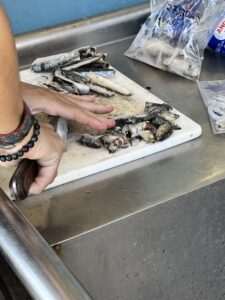 On Monday I started my day off with meeting a bunch of new hires at a new hire meeting. During this meeting we went around the different places near the REEF such as the Marine Bio Tech lab, and the Marine Laboratory. After the new hire meeting I attended both the LISE and Aquarist meetings. LISE stands for Lead Informal Science Educator. These guys are basically the leaders at the REEF during programs and aquarist tasks. After these meetings me and one of the LISE went into a holding research facility to look at the white abalone. White abalone are actually reproductively extinct in the wild. This means that it is impossible for them to reproduce. This is because a certain amount of abalone need to be in a certain area, the abalone reproduce by “Broadcast Spawning”. This means that internal fertilization doesn’t happen and instead fertilization happens outside of the abalone, in the water. I also learned more about semi-open, open, and closed systems. A quick explanation is that a semi-open system has both fresh water coming in as well as old water being cycled back into the tank. An open system is when you constantly have new water coming into the tanks. And finally a closed system is when you always have old water filtering back into the tank. The adult white abalone have a semi-open system and the baby abalone have an open system. Whenever we were checking the abalone we always start with washing our hands with nothing but fresh water. We also start by checking the adult abalone because since the babies are in an open
On Monday I started my day off with meeting a bunch of new hires at a new hire meeting. During this meeting we went around the different places near the REEF such as the Marine Bio Tech lab, and the Marine Laboratory. After the new hire meeting I attended both the LISE and Aquarist meetings. LISE stands for Lead Informal Science Educator. These guys are basically the leaders at the REEF during programs and aquarist tasks. After these meetings me and one of the LISE went into a holding research facility to look at the white abalone. White abalone are actually reproductively extinct in the wild. This means that it is impossible for them to reproduce. This is because a certain amount of abalone need to be in a certain area, the abalone reproduce by “Broadcast Spawning”. This means that internal fertilization doesn’t happen and instead fertilization happens outside of the abalone, in the water. I also learned more about semi-open, open, and closed systems. A quick explanation is that a semi-open system has both fresh water coming in as well as old water being cycled back into the tank. An open system is when you constantly have new water coming into the tanks. And finally a closed system is when you always have old water filtering back into the tank. The adult white abalone have a semi-open system and the baby abalone have an open system. Whenever we were checking the abalone we always start with washing our hands with nothing but fresh water. We also start by checking the adult abalone because since the babies are in an open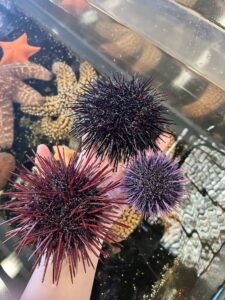 system there is a chance that if we go into the baby abalone tank first, bacteria can get into the adult tank. The way bacteria can get into the adult tank through an open system is because the water isn’t repeatedly filtered. After checking all of the white abalone it was time to do our aquarist tasks. Today we did food prep, and after that we had a UCSB orientation come into the REEF. After that I was off for the day and I enjoyed it at my apartment. Today was a thrilling, but long day. The photo above is us prepping some anchovies as well as two Red Urchins and one Purple Urchin
system there is a chance that if we go into the baby abalone tank first, bacteria can get into the adult tank. The way bacteria can get into the adult tank through an open system is because the water isn’t repeatedly filtered. After checking all of the white abalone it was time to do our aquarist tasks. Today we did food prep, and after that we had a UCSB orientation come into the REEF. After that I was off for the day and I enjoyed it at my apartment. Today was a thrilling, but long day. The photo above is us prepping some anchovies as well as two Red Urchins and one Purple Urchin
On Tuesday we started the day bright and early with an “All REEFer Meeting” this is where everyone who works with the REEF is able to get together for a meeting. This was also feeding day so we did that. After that we had the UCSB junior guard come into the REEF and we also did a 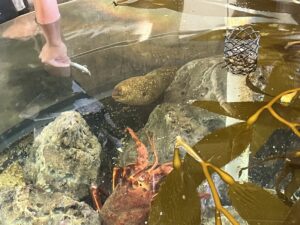 beach scavenger hunt and bluff walk activity. The beach scavenger hunt is where we had each person pick two things they find on the beach. Then we sort the items into two categories. Abiotic and Biotic. Abiotic means non living, Biotic means living. This is a fun way to teach people the difference between the two. The photo shows us feeding our California Moray Eel, Love, with a special appearance from Boris, our California Spiny Lobster
beach scavenger hunt and bluff walk activity. The beach scavenger hunt is where we had each person pick two things they find on the beach. Then we sort the items into two categories. Abiotic and Biotic. Abiotic means non living, Biotic means living. This is a fun way to teach people the difference between the two. The photo shows us feeding our California Moray Eel, Love, with a special appearance from Boris, our California Spiny Lobster
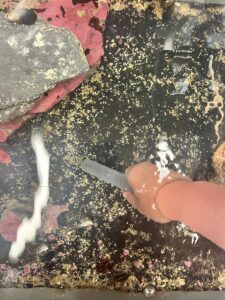 On Wednesday we started the day off with the family vacation center coming in. This is a new group and not the same ones as last week. But it was still a great time. After the Family vacation center was all wrapped up, the Dunn Science n’ Sun Camp came too the REEF. This group was a little bit older than the previous but we still made it fun for everyone. After all of our programs were done for the day we siphoned. This is how we clean all the leftover
On Wednesday we started the day off with the family vacation center coming in. This is a new group and not the same ones as last week. But it was still a great time. After the Family vacation center was all wrapped up, the Dunn Science n’ Sun Camp came too the REEF. This group was a little bit older than the previous but we still made it fun for everyone. After all of our programs were done for the day we siphoned. This is how we clean all the leftover 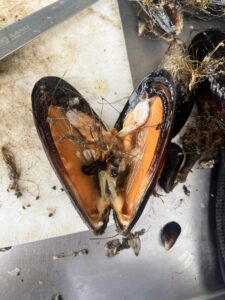 food and waste from the previous day of feeding. I also helped shuck mussels for samples. We shuck for samples in order to check the water quality because mussels are filter feeders. The photo above is me siphoning! And the photo to the side is the inside of a mussel!
food and waste from the previous day of feeding. I also helped shuck mussels for samples. We shuck for samples in order to check the water quality because mussels are filter feeders. The photo above is me siphoning! And the photo to the side is the inside of a mussel!
On Thursday we had the UCSB Summer Day Camp come in. After the program wa done we did our daily aquarist tasks, which today consisted of food prep! After we did food prep we had UCSB Orientation and Training for Tech Trek, which is a program coming in two weeks. Today was actually exciting despite my rundown of the day. Today the sea stars actually started spawning! 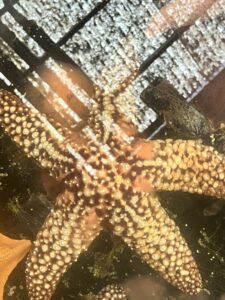 Sea Stars also Broadcast Spawn, unfortunately they started spawning during our programs so the water got a little foggy, but it was cool to see. The photo on the left is a photo of one of our Giant Spined Sea Stars Spawning.
Sea Stars also Broadcast Spawn, unfortunately they started spawning during our programs so the water got a little foggy, but it was cool to see. The photo on the left is a photo of one of our Giant Spined Sea Stars Spawning.
On Friday another group from the UCSB Day Camp came and then we did our aquarist task, which today was feeding. After we were done with feeding we had this event called an “Open Door”. This just means we are open to the public! It was exciting to see so many people come in. It got a little crazy sometimes, and at one point we had a group with more than 20 people come in. However, we pushed through and made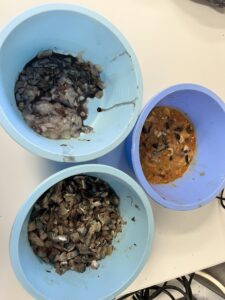 it a great time for everyone! On the side is a photo of our feeding bowls that consist of Anchovies, Squid, and Mussels.
it a great time for everyone! On the side is a photo of our feeding bowls that consist of Anchovies, Squid, and Mussels.
On Saturday we ended our week with siphoning and open door again. In case if you don’t know how our schedule works yet, we start with food prep, feed the next day, and then end with siphoning. In my free time I’ve continued cooking, and I’ve also been reading a book written by Sarah J. Maas called Crescent City. Ive also done some more beach exploring and enjoying the beautiful Isla Vista area by going out to watch a sunset down by Isla Vista Beach.
This week was exciting! And I’m looking forward to continuing my internship here at the REEF for two more weeks. Thank You all for reading!

There are no comments published yet.